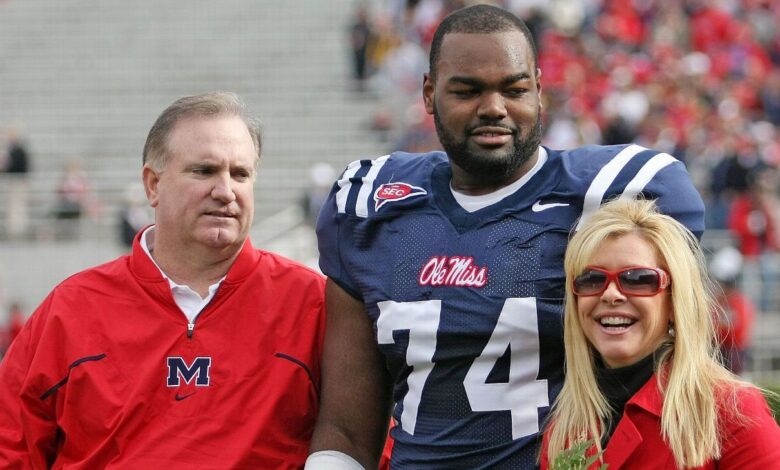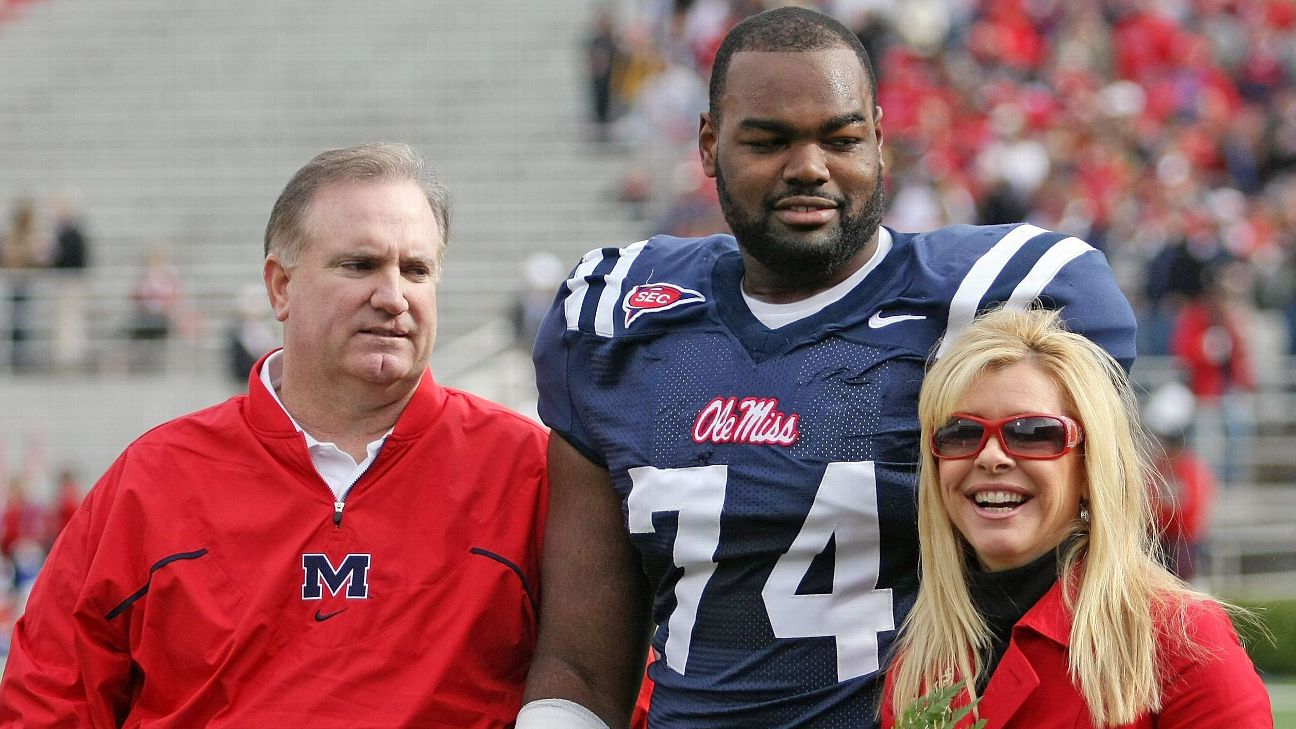FAQ: Sorting out ‘Blind Side’ claims


Retired NFL star Michael Oher and the family that helped lift him out of homelessness as a teenager exchanged heated public volleys this week, with Oher accusing Sean and Leigh Anne Tuohy of earning millions off his story and the family accusing him of an attempted “shakedown.”
The legal truth is yet to be hashed out in a Tennessee probate court, but both sides have laid out evidence about what happened between Oher and the Tuohys, not just in court petitions and news releases this week but in their books and media appearances dating to 2010.
ESPN reviewed publicly available information from both sides and consulted experts in adoption law, among other topics, to compile what is known about the major issues in the case.
Background
In his 14-page petition, filed in Shelby County, Tennessee, probate court Monday, Oher alleges the Tuohys misled him into a conservatorship that gave them legal authority to make business deals in his name. He also alleges he saw no proceeds from the 2009 film, “The Blind Side,” which earned over $300 million.
An attorney for the Tuohys fired back Tuesday, calling Oher’s claims “outlandish” and saying “the idea that the family ever sought to profit off Mr. Oher is not only offensive, it is transparently ridiculous.” Attorney Martin Singer also alleged Oher had threatened to go public unless the Tuohys paid him $15 million. An attorney for Oher didn’t directly address that allegation, saying “justice will be served in the courtroom, and we hope to get there quickly.”
Neither Oher nor members of the Tuohy family have responded to interview requests from ESPN, and neither side has offered documentation to support its claims.
Why did the family seek conservatorship of Oher in August 2004?
Sean Tuohy told the online The Memphian in an interview Monday that the family sought conservatorship to avoid violating NCAA recruiting rules since he, a former Ole Miss basketball player, could be classified as a booster.
“Michael was obviously living with us for a long time, and the NCAA didn’t like that,” Tuohy told the publication. “They said the only way Michael could go to Ole Miss was if he was actually part of the family. I sat Michael down and told him, ‘If you’re planning to go to Ole Miss — or even considering Ole Miss — we think you have to be part of the family. This would do that, legally.'”
NCAA spokesperson Meghan Durham declined comment Wednesday.
As to how the Tuohys have portrayed the relationship through the years, their 2010 book, “In a Heartbeat: Sharing the Power of Cheerful Giving,” never uses the word “conservatorship” in 271 pages, but it includes a form of “adoption” more than 30 times.
On Page 169, the Tuohys wrote:
So the idea of adopting Michael came to us quite naturally. One evening we told him that we wanted to formally become his guardians. It wasn’t an executive family session or anything. We were all just lounging around the dining table.
“We’re thinking of making this official,” Leigh Anne told him. “How do you feel about that?”
We explained that it would require some paperwork. We told him that his biological mother would have to appear in court to give her consent, but that we felt adopting him would be a good idea.
That’s when he said, “I already thought I was part of the family.”
We said, “You are.”
“Well, let’s go do it then.”
“Okay, fine,” Leigh Anne said.
The book makes three mentions of NCAA rules, but only in reference to Oher becoming academically eligible.
Michael Lewis’ book, “The Blind Side: Evolution of a Game,” which first chronicled Oher’s story and forms the basis for the fictionalized film, never uses the word conservatorship, but it calls the Tuohys legal guardians for Oher. It says the subject of adoption first came up as Oher was considering his college choices.
Here’s what a key passage says:
He of course told Leigh Anne and Sean that he really liked Ole Miss — but only after Leigh Anne and Sean explained to him that, if he had any intention of going to Ole Miss, they really ought to go through the process of formally adopting him, so that the many gifts they had already bestowed on him might be construed not as boosters’ graft but parental love.
The book also chronicles the recruiting frenzy around Oher and an ensuing NCAA investigation in 2005, after “some college football coach, and quite possibly more … had gone to the NCAA and accused the Tuohys of abducting Michael and showering him with possessions in exchange for becoming the future left tackle of the Ole Miss Rebels.”
Lewis, a childhood friend of Sean Tuohy’s, did not return a call or email from ESPN to his publisher. He told the Washington Post in an interview Wednesday that he feels sad about Oher’s allegations. “They showered him with resources and love,” Lewis said. “That he’s suspicious of them is breathtaking. The state of mind one has to be in to do that – I feel sad for him.”
How has Oher described the process leading to the conservatorship?
On Page 168 of his 2011 bestseller, “I Beat the Odds,” Oher describes the legal process of joining the Tuohy family in the summer after he graduated high school:
Leigh Anne and Sean had already assumed responsibility for me as guardians, which allowed them to sign my school permission slips and take me to medical appointments. This last step was the one that would make everything binding.
It kind of felt like a formality, as I’d been a part of the family for more than a year at that point. Since I was already over the age of eighteen and considered an adult by the state of Tennessee, Sean and Leigh Anne would be named as my “legal conservators.” They explained to me that it means pretty much the exact same thing as “adoptive parents,” but that the laws were just written in a way that took my age into account. Honestly, I didn’t care what it was called. I was just happy that no one could argue that we weren’t legally what we already knew was real: We were a family.
This week’s probate filing alleges that the Tuohys invited Oher to live with them in July 2004.
The petition alleges:
“Almost immediately after Michael moved in, the Tuohys presented him with what he understood to be legal papers that were a necessary step in the adoption process. Michael trusted the Tuohys and signed where they told him to sign.”
“What he signed, however, and unknown to Michael until after February of 2023, were not adoption papers, or the equivalent of adoption papers. Instead, it was the Petition for Appointment of Conservators which was filed in this cause on Aug. 9, 2004 by Debra Branan, attorney of record in this matter. Ms. Branan was so close to the Tuohy family that Michael was encouraged to refer to her as Aunt Debbie.”
Branan has not returned calls from ESPN.
Why did the family not seek an adoption instead of conservatorship?
Sean Tuohy told The Memphian: “We contacted lawyers who had told us that we couldn’t adopt over the age of 18; the only thing we could do was to have a conservatorship. We were so concerned it was on the up-and-up that we made sure the biological mother came to court.”
Elizabeth Psar, a Knoxville family attorney who has been practicing for 19 years, told ESPN the Tuohys could have adopted Oher, as long as his birth parents were notified and he agreed to the process. According to documents, Oher’s mother, Denise Oher, signed off on the conservatorship.
“Adults can be adopted in Tennessee, but, obviously, the adults have to consent to it,” she said. For someone to be adopted, she said, it would have taken having a lawyer file a court petition. “It would have been easy to file that, like you would anything else,” Psar said.
How much did the Tuohy family earn from the film?
According to the legal filing, the movie paid the Tuohys and their two birth children $225,000 each, plus 2.5% of the film’s “defined net proceeds.” Oher’s petition says he received no money.
Sean Tuohy told The Memphian the family was not paid directly for the film.
“We didn’t make any money off the movie,” Tuohy told the publication. “Well, Michael Lewis gave us half of his share. Everybody in the family got an equal share, including Michael. It was about $14,000, each. We were never offered money; we never asked for money.”
The Tuohys’ book, on Page 244, says they were paid by Alcon Productions. Here’s how they framed the payment:
Contrary to popular belief, the movie did not wildly enrich us. We had no participation in the profits; we only received a fee for selling our name rights to Alcon, which all in all was not a large amount. We divided it five ways.
In a statement Tuesday, a member of the Tuohys’ legal team said the family “received a small advance from the production company and a tiny percentage of net profits. They insisted that any money received be divided equally. And they made good on that pledge.”
In an interview with Barstool on Monday, the Tuohys’ son SJ indicated the payments included what he called a “2½-percent kicker down the line.”
“Again, that’ll be public so someone that really cares to go back and read through it can do so,” SJ Tuohy told Barstool. “And I bet though that we’ve probably, we as in me personally … I’ve made like 60, 70 grand the course of the last four or five years. The first year was like a $14,000 check and then it was like an eight and seven, whatever, so on and so forth.”
“But it started off a little higher and then it went down, which after it made hundreds of millions of dollars, I think someone said, ‘OK, we can’t hide this any longer.’ The money he’s suing for is actually the same thing. It’ll be very well-documented.”
Tuohy said it was “super-well-documented that [Oher] was in the middle of the plan” but “declined the exact money that I think is mentioned.”
In his interview with the Post, Lewis said Twentieth Century Fox paid him $250,000 for the option to make his book a film, and he split that with the Tuohy family. Lewis told the Post he cleared $70,000 after taxes and agent fees. He said Alcon, which eventually made the film, paid him and the Tuohys each around $350,000 from the profits. He told the Post the family planned to share the money with Oher, but he declined his royalty checks. Lewis said he believed they deposited the money in a trust fund for Oher’s son.
At a Wednesday news conference in Memphis, two lawyers for the Tuohy family said that, overall, each member of the family and Oher made about $100,000 from the movie.
“Imagine a pie, divided by five,” Steve Farese said. “We estimate each person received $100,000.”
Farese added that Oher’s money was first paid to the Tuohys, who then gave Oher his portion. The lawyers said the arrangement allowed Oher to comply with NCAA rules. They added that Oher did not want to change how the money was distributed even when he went on to the NFL.
At the same news conference, the attorneys said the Tuohys would consent to ending the conservatorship.
Did Oher threaten the family with revealing the story?
In his Barstool interview, SJ Tuohy said he’d “find it hard to believe” that Oher only found out about the conservatorship in February and hinted that Oher had threatened the family. The interview came before attorney Martin Singer alleged a $15 million “shakedown.”
Here’s what SJ Tuohy said Monday:
“I went back to my texts today … to go back to look at our family group texts and see what things had been said, and there were things back in 2020, 2021 that were like, ‘If you guys give me this much, then I won’t go public with things,” SJ Tuohy said.
Attorney Don Barrett, a member of Oher’s legal team, said in a statement Tuesday night: “We try cases in the courtroom based on the facts. We have confidence in our judicial system and in our client Michael Oher.”




